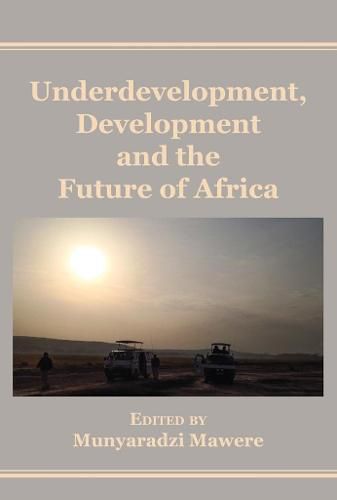Readings Newsletter
Become a Readings Member to make your shopping experience even easier.
Sign in or sign up for free!
You’re not far away from qualifying for FREE standard shipping within Australia
You’ve qualified for FREE standard shipping within Australia
The cart is loading…






This title is printed to order. This book may have been self-published. If so, we cannot guarantee the quality of the content. In the main most books will have gone through the editing process however some may not. We therefore suggest that you be aware of this before ordering this book. If in doubt check either the author or publisher’s details as we are unable to accept any returns unless they are faulty. Please contact us if you have any questions.
In view of the resilience of Africa’s underdevelopment, what do Africans make of their determined aspirations for development? The continent of Africa has constantly drawn global attention, most especially for both human and natural evils. Underdevelopment, it appears, is one of the most eminent threatening evils. It has plunged and promises to maintain the majority of Africa in abject poverty, insecurity, and vulnerability. What perpetuates the ghost and gory of underdevelopment in Africa, despite a proliferation of development rhetoric and initiatives? How do ordinary Africans react to repeated talk and claims of development with little evidence of transformation for the better in their material circumstances? This book interrogates the tenacity of underdevelopment amid calls for Africa to rise from its slumber and reclaim its position in global affairs as the mother continent of humankind. It contributes to the ongoing debates on why Africa remains trapped in the clutch of underdevelopment many decades after the purported end of colonialism. The book comes at a critical time in human history; a time when the talk on Africa’s [under-]development is louder due to the ravages of economic downturns and dysfunctional conflicts. It poses a challenge to development practitioners, civil society activists, statesmen, economists, political scientists and theorists to rethink and reconsider their role as technocrats, experts and ambassadors of positive change in Africa and the world beyond.
$9.00 standard shipping within Australia
FREE standard shipping within Australia for orders over $100.00
Express & International shipping calculated at checkout
This title is printed to order. This book may have been self-published. If so, we cannot guarantee the quality of the content. In the main most books will have gone through the editing process however some may not. We therefore suggest that you be aware of this before ordering this book. If in doubt check either the author or publisher’s details as we are unable to accept any returns unless they are faulty. Please contact us if you have any questions.
In view of the resilience of Africa’s underdevelopment, what do Africans make of their determined aspirations for development? The continent of Africa has constantly drawn global attention, most especially for both human and natural evils. Underdevelopment, it appears, is one of the most eminent threatening evils. It has plunged and promises to maintain the majority of Africa in abject poverty, insecurity, and vulnerability. What perpetuates the ghost and gory of underdevelopment in Africa, despite a proliferation of development rhetoric and initiatives? How do ordinary Africans react to repeated talk and claims of development with little evidence of transformation for the better in their material circumstances? This book interrogates the tenacity of underdevelopment amid calls for Africa to rise from its slumber and reclaim its position in global affairs as the mother continent of humankind. It contributes to the ongoing debates on why Africa remains trapped in the clutch of underdevelopment many decades after the purported end of colonialism. The book comes at a critical time in human history; a time when the talk on Africa’s [under-]development is louder due to the ravages of economic downturns and dysfunctional conflicts. It poses a challenge to development practitioners, civil society activists, statesmen, economists, political scientists and theorists to rethink and reconsider their role as technocrats, experts and ambassadors of positive change in Africa and the world beyond.